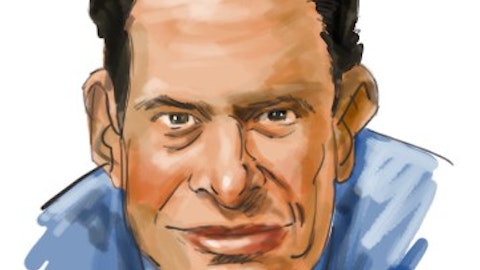Jaime Caballero: Hello, Lorieanna this is Jaime. With regards to your first question around FEPC, basically you €“ the balance of FEPC has been accruing at a rate of around COP2.5 billion to COP4 billion per month depending on the month. There’s actually two or three key factors that are associated to that. You have on one end how product differentials internationally evolve. On the other hand you have how the exchange rate evolves. And thirdly, as a major item of course you have the interventions that the government is making around domestic prices. I actually would argue that, there’s a fourth element which is some methodological adjustments that go into a lot of detail but they actually also influence the rate of accrual.
The extent of adjustments that need to be made will vary depending on these other factors. So you actually need to look at all the factors in unison, in order to close, if you will the gap right to close the gap. I’d say directionally, I’d say that the adjustments that the government has announced certainly going in the right direction. And if they are maintained and implemented on a monthly basis we believe that gap is going to be narrowed in a significant way by the end of next year right? But again there’s always the uncertainty around how these other factors evolve. With regards to your second question around inflationary pressures in CapEx I firstly say that, the CapEx execution that you saw in 3Q is by and large, and by a massive amount dictated by activity execution.
It is by no means a result of inflation I think the inflation that we have seen in our CapEx outlay so far has been minimum. What you’re seeing is basically the result of an increased activity set where we have more rigs, we have more workover units. We have more crews in the ground and that is actually translating into more production. So that’s really the headwind. Now, as we look into next year as we look into next year and more longer-term CapEx deployment inflation it does become a factor. It does become a factor. As we sign new contracts associated to those capital projects inflation will be a factor. And I’d say that, depending on the specific commodity subsector or service subsector, those effects can be anywhere between 10% to 20%, anywhere in that range.
I think you would have to go into the specifics of each project to see to what extent they are mitigated or not. I would say, as a gross average I would say that a CapEx effect next year of between 13% to 50% is a reasonable estimate. I hope this helps Soriana. Thank you.
Unidentified Analyst: Thanks, Jaime.
Operator: Thank you. Our next question comes from Badr El Moutawakil from Barclays. Please go ahead.
Badr El Moutawakil: Yes. Thank you so much. Congrats on your earnings. Two quick questions for me. First one is are you expecting to receive any FEPC payments from any excess cash from Hacienda by year-end? I think that, we read on the news that Ecopetrol could potentially receive something around COP7 trillion in year-end in addition of the COP19 trillion that Jaime you mentioned earlier on the call. So just curious if you have any updates in terms of that? And my second question is regarding your gross debt level for 2023. So are you thinking about keeping the gross debt stable around $24 billion? I’m just asking because if I look at the company right now in 2022 full year picture and I just try to do like a quick parallel in 2023 this new government is going to increase taxes, let’s say, by COP5 trillion on Ecopetrol also depending on the assumptions.
And so the increase in terms of taxes, and obviously, on the upstream is not — based on our model it’s not going to offset the pressure from the FEPC. And even if we increase local prices by let’s call it, 20% we don’t have the FEPC balance, and the working capital balance offsetting these taxes. So just curious if you can give us some — your view in terms of gross debt in 2023 and then potentially with the risk of funding any dividends or potentially these higher taxes with gross debt or you don’t think so? You think that you can fund it extensively with cash. Thank you so much.




